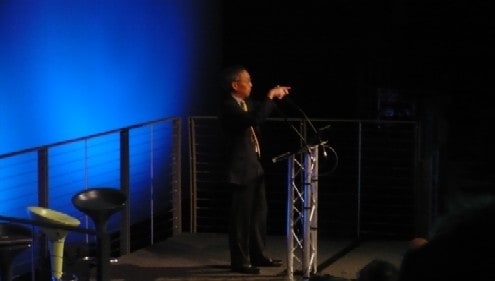
By James Dacey
“I was getting increasingly concerned that the climate was changing and that it was being caused by humans.”
Those were the words yesterday of Steven Chu, the US secretary of energy, speaking in Scotland about why he decided to park his glistening academic career to move into politics.
Chu was in Glasgow where he gave the opening speech as part of a national day of celebration of the 50th birthday of the laser. His broad-sweeping talk began with an overview of laser-cooling – the work for which he was awarded 1997’s Nobel Prize for Physics – before moving on to a discussion of molecular biology and the “alien” physics that occurs within the human body.
Then, with about half his allocated time remaining, Chu made a sudden gear change and began to talk more plainly about his motivation for moving into politics. “There is no real credible argument why the Earth will not warm up over a 50–100 year time period,” he explained.
He went on to talk about the imperative of developed nations to act as we shift increasingly towards a carbon-strained world. “The development of clean energy technologies and the rebuilding of an energy-efficient infrastructure is actually a job growth thing – it’s a demand really needed that can actually spur economies all over the world and it will be essential for our economic prosperity”.
Chu acknowledged the fact that the US is still lacking a comprehensive climate and energy bill, but he talked with great excitement about his how he is spending the $90 billion allocated to developing clean energy sources as part of the US Recovery Act passed last year. This includes the Energy Innovation Hubs, which, Chu says are partly inspired by earlier hierarchy of facilities such as Los Alamos National Laboratory and Bell Labs, where the best young scientists were elevated to management positions to accelerate the science.
Chu warned that failure to do this would leave the US and other developed countries lagging behind China. He talked about his meetings with the Chinese premiere, Wen Jiabao. “They want to be leaders in every energy technology because they think it will lead to their future prosperity – and because there are a lot of engineers in their government”. As examples, he cited China’s plans to generate 100 GW of wind by 2010 and their plans to build 25 new nuclear reactors.



